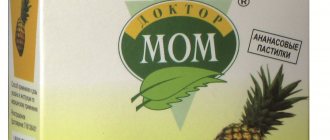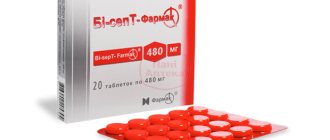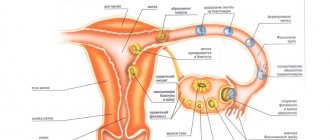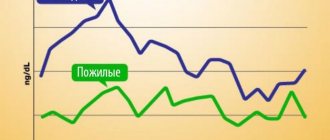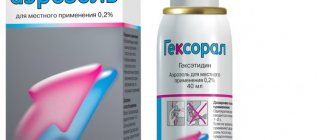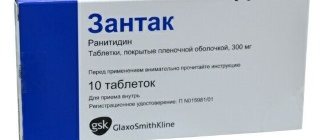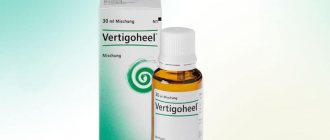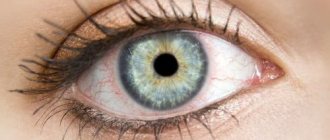pharmachologic effect
Aleve is a non-steroidal anti-inflammatory drug, a derivative of naphthylpropionic acid, which has anti-inflammatory, antipyretic and analgesic effects.
The mechanism of action of the drug is based on inhibition of the COX enzyme, leading to inhibition of the process of prostaglandin synthesis.
The drug Aleve inhibits platelet aggregation.
It has the ability to reduce pain, including joint pain during movement and at rest, morning swelling and stiffness of joints, and helps expand the range of available movements.
The anti-inflammatory effect of the drug occurs 7 days after the start of treatment.
Aliva's analogs
Medicines similar in active substance are such drugs as Anaprox, Inaprol, Xenar, Methoxypropriocin, Noritis, Proxen and Floginas. Analogues of Aleve with the same mechanism of action, as well as belonging to the same pharmacological group, include the following drugs:
- Advil;
- Bonifen;
- Dexalgin;
- Ibuprofen;
- Ibuprom Max;
- Ketonal;
- MIG 400;
- Novigan;
- Nurofen;
- OKI;
- Rakstan-Sanovel;
- Solpaflex;
- Teraflex Advance;
- Flamax.
Indications for use
According to the instructions, Aliv is prescribed for:
- Rheumatoid, gouty, juvenile arthritis;
- Osteoarthritis;
- Ankylosing spondylitis;
- Articular syndrome in case of exacerbation of gout;
- Pain in the spine;
- Myalgia;
- Neuralgia;
- Osteoarthrosis;
- Traumatic inflammation of the musculoskeletal system and soft tissues;
- Adnexitis, infectious and inflammatory diseases of the ENT organs, dental and headaches, primary dysmenorrhea as an adjuvant.
Directions for use and dosage
Tablets and suspension of the drug Aleve are taken orally. The tablets must be swallowed whole with liquid. It is also possible to take tablets with meals.
The drug is taken:
- In the acute stage of the disease - 2 times a day, 0.5-0.75 g. In this case, the maximum dose should be no more than 1.75 g per day;
- As maintenance therapy - 500 mg per day, divided into 2 doses.
For algodismenorrhea, the drug is prescribed at an initial dose of 500 mg, and then 275 mg every 6-8 hours for 3-4 days.
For an acute attack of gout, the initial dose is 825 mg; then - 275 mg every 6-8 hours.
Aleve rectal suppositories are usually placed at night.
If it is necessary to use naproxen in large dosages, then the combined use of the drug in tablets and suppositories is possible.
For children 1-5 years old, the drug is prescribed at 2.5-5 mg per kg of body weight, divided into 1-3 doses for no more than 14 days.
For children over 5 years of age with juvenile arthritis, the drug is prescribed in a daily dose of 10 mg per kg of body weight.
Analgesic antipyretic with hypnotic effect Bayer Aleve, 100 capsules
Indications
- Inflammatory and degenerative diseases of the musculoskeletal system: rheumatoid, juvenile chronic, gouty arthritis, ankylosing spondylitis (Bechterew's disease), osteoarthritis.
- Pain syndrome: myalgia, ossalgia, neuralgia, arthralgia, radiculitis, headache and toothache, tendonitis, in cancer, post-traumatic and postoperative pain syndrome accompanied by inflammation, algodismenorrhea, andexide, childbirth (as an analgesic and tocolytic agent).
- Infectious and inflammatory diseases of the ENT organs with severe pain syndrome (as part of complex therapy): pharyngitis, tonsillitis, otitis media.
- Feverish syndrome with “colds” and infectious diseases.
Active ingredient, group: Naproxen (Naproxen), NSAID
Dosage form: tablets, film-coated tablets
Contraindications
Hypersensitivity, erosive and ulcerative lesions of the gastrointestinal tract (in the acute phase), the “aspirin” triad (a combination of bronchial asthma, recurrent polyposis of the nose and paranasal sinuses and intolerance to ASA and pyrazolone-type drugs), inhibition of bone marrow hematopoiesis, liver and/or kidney failure, pregnancy, lactation period, children's age (up to 1 year).
With caution: CHF, children (up to 16 years).
Directions for use and doses
Inside. Aliva tablets should be taken whole with liquid and can be taken with meals. In the acute stage of the disease - 0.5-0.75 g 2 times a day.
The maximum daily dose is 1.75 g. For maintenance therapy - an average daily dose of 500 mg in 2 doses (morning and night).
For an acute attack of gout, the first dose is 825 mg; then 275 mg every 8 hours.
For algodismenorrhea - 500 mg of Aleve in the first dose, then 275 mg every 6-8 hours for 3-4 days.
For migraine - 500 mg.
Children aged 1 to 5 years - a daily dose of 2.5-5 mg/kg in 1-3 doses; the course of treatment should not exceed 14 days.
For juvenile arthritis in children over 5 years of age, the daily dose is 10 mg/kg.
The preferred dosage form for children is a suspension.
pharmachologic effect
NSAIDs have anti-inflammatory, analgesic and antipyretic effects associated with non-selective suppression of the activity of COX1 and COX2, which regulate the synthesis of Pg.
Side effects
NSAID gastropathy (damage to the antrum of the stomach in the form of erythema of the mucous membrane, hemorrhages, erosions and ulcers).
Nausea, vomiting, epigastric discomfort, skin rash, urticaria, angioedema; headache, drowsiness, tinnitus, dizziness, weakness, slow reaction speed; erosive and ulcerative lesions of other parts of the gastrointestinal tract, bleeding and perforation of the gastrointestinal tract; eosinophilic pneumonia; thrombocytopenia, granulocytopenia, aplastic anemia, hemolytic anemia; hearing loss, impaired renal or liver function. Overdose. Symptoms: heartburn, dyspepsia, nausea, vomiting, drowsiness. Treatment: gastric lavage, activated carbon - 0.5 g/kg. Dialysis is ineffective.
Special instructions: If it is necessary to determine 17-ketosteroids, the drug should be discontinued 48 hours before the study. It is necessary to monitor the functions of the liver and kidneys, the composition of peripheral blood.
It should be taken into account that Aleve increases bleeding time.
Interaction
When administered concomitantly with Aleeva, this drug may cause a decrease in the diuretic effect of furosimide;
enhancing the effect of indirect anticoagulants. Increases the toxicity of phenytoin, sulfonamides, methotrexate (blocks tubular secretion). Treatment with Aleve reduces the hypotensive effect of beta-blockers. Reduces the excretion of Li+ and increases its concentration in plasma. Antacid drugs containing Mg2+ and Al3+ reduce the absorption of Aleve. Myelotoxic drugs increase the manifestations of hematotoxicity of the drug. Note: Not a medicine. There are contraindications. Before use, consult a specialist.
Side effects
Taking the drug can cause various side effects in patients:
- Digestive system: vomiting, nausea, epigastric discomfort, erosive and ulcerative lesions of the gastrointestinal tract - rarely, perforation and bleeding in the gastrointestinal tract, disturbances in the liver;
- Hematopoietic system: thrombocytopenia - rarely, aplastic anemia, granulocytopenia, hemolytic anemia;
- Central nervous system and peripheral nervous system: drowsiness, headache, slowing of psychomotor reactions, hearing impairment - rarely;
- Urinary system: renal dysfunction - rare;
- Respiratory system: eosinophilic pneumonia;
- Allergic reactions: urticaria, skin rash, Quincke's edema.
When using the drug Aleve in the form of rectal suppositories, mucous discharge mixed with blood, as well as painful bowel movements, may occur.
Contraindications
The use of Aleve is prohibited for acute erosive and ulcerative lesions of the gastrointestinal tract, inhibition of the hematopoietic process in the bone marrow, renal and liver failure, during lactation, pregnancy, bronchial “aspirin” asthma, occurring simultaneously with chronic polyposis of the nose and sinuses against the background of intolerance to pyrazolone drugs series (“aspirin” triad).
The medication is contraindicated for children under one year of age.
Aleve is prescribed with caution to patients under 16 years of age and against the background of chronic heart failure.
Interaction with other drugs
When used simultaneously with antacids, the absorption of naproxen is reduced.
When taken simultaneously with prednisolone, the plasma concentration of prednisolone increases; with probenecid – naproxen concentrations decrease; with salicylamide – the effect of salicylamide is enhanced.
When Aleve is used together with indirect anticoagulants, a slight increase in the effect of anticoagulants is possible.
When used together with amoxicillin, nephrotic syndrome may develop; with aspirin – decrease in plasma naproxen levels.
When used together with diazepam, the pharmacokinetic parameters of diazepam may change; with lithium carbonate – possible increase in plasma lithium levels; with caffeine – the effect of naproxen may be enhanced; with methotrexate – increased toxicity of methotrexate.
When used simultaneously with morphine, myoclonus may develop.
When used together with furosemide, the diuretic effect of furosemide is reduced.
special instructions
Aleve should be prescribed with caution if there is a history of kidney and liver disease, gastrointestinal tract disease, arterial hypertension, dyspeptic symptoms, heart failure, or after major surgery.
When treating with the drug, systematic monitoring of the functioning of the kidneys and liver, and the picture of peripheral blood is required.
If it is necessary to determine the concentration of 17-ketosteroids, the drug is discontinued 2 days before the study.
Aleve affects concentration and the speed of psychomotor reactions, so during its use it is necessary to refrain from performing hazardous activities.
Aleve, 220 mg, tablet powlekane, 24 szt.
Compound
1 tablet contains
active ingredient: 220 mg naproxen sodium.
Other ingredients: povidone K30, microcrystalline cellulose, talc, magnesium stearate.
Shell components: Opadry Blue YS-1-4215: titanium dioxide, hypromeloza, macrogol 8000, indigo carmine E132.
Dosage
Method of administration
Each dose should be taken with a glass of water—this medication can be taken with or without food. Food may slightly slow down the absorption of the drug.
Use in adults
One dose of 220 mg every 8 to 12 hours until symptoms disappear. In some people, an initial dose of 440 mg followed by 220 mg after 12 hours may result in increased pain relief.
Do not exceed the daily dose of 660 mg unless your doctor decides otherwise. .
Aleve should not be used for more than ten days for pain or for more than 3 days for fever, unless under the supervision of a physician. If pain or fever occurs, or changes in symptoms occur, you should consult your doctor.
Use in children
Children under 16 years of age should not use Aleve unless directed otherwise by their doctor.
Action
The drug Aleve belongs to the group of nonsteroidal anti-inflammatory drugs (NSAIDs), which, through reversible inhibition of prostaglandin synthesis, have analgesic, antipyretic and anti-inflammatory effects. Aleve reduces pain, reduces fever and suppresses inflammatory reactions.
The drug Aleve has a rapid and prolonged effect.
Indications
Treatment of pain of minor and moderate severity, such as: headache, toothache, myalgia, joint pain, back pain, dysmenorrhea, pain and ailments of minor severity associated with the common cold. Fevers.
Contraindications
When should you not use Aleve?
- if the patient is allergic to the active substance or any of the other ingredients of this medicine.
- if in the past, after taking acetylsalicylic acid or other non-steroidal anti-inflammatory drugs, bronchial asthma, urticaria or allergic reactions occurred,
- if, after using non-steroidal anti-inflammatory drugs, bleeding from the gastrointestinal tract occurs or the wall of the gastrointestinal tract is punctured,
- if the patient has an active peptic ulcer,
- if the patient has a hemorrhagic defect,
- if the patient has severe heart failure,
- if the patient has severe renal or hepatic insufficiency,
- if gastrointestinal ulcers or bleeding from an ulcer were established several times in an interview,
- if the patient experiences gastrointestinal discomfort
- in the third trimester of pregnancy.
Side effects
Like all drugs, this drug may cause side effects, although not everyone gets them.
Adverse reactions can be minimized by using the lowest effective dose for the shortest possible time required for resolution of symptoms. In connection with the use of drugs from the group of non-steroidal anti-inflammatory drugs, edema, arterial hypertension and heart failure have occurred. Taking drugs such as Aleve may be associated with a slight increase in the risk of heart attack (myocardial infarction) or stroke.
Common side effects (may occur in 1 in 10 to 1 in 100 patients):
• dizziness, headache, feeling of emptiness in the head
• upset stomach, nausea, heartburn, abdominal pain
Not very common side effects (may occur in 1 in 100 to 1 in 1000 patients):
• lethargy, insomnia, drowsiness
• dizziness
• diarrhea, constipation, vomiting
• rash, itching, urticaria
Rare side effects (may occur in 1 in 1,000 to 1 in 10,000 patients):
• gastrointestinal ulcers (sometimes with bleeding or puncturing the wall of the gastrointestinal tract), gastrointestinal bleeding, hematemesis, tarry stools
• Quincke's edema
• renal dysfunction.
• swelling of the arms and legs, especially in patients with arterial hypertension or renal failure, fever (including chills and illnesses that occur with high fever)
Warnings and Precautions
Aleve and other drugs
You should tell the doctor or pharmacist about all the medications the patient is currently or recently taking, as well as any medications the patient plans to use.
Aleve with food and drinks
Food may slightly delay the absorption of the active substance.
Pregnancy and breastfeeding
If you are pregnant or breastfeeding, think you may be pregnant, or are planning to have a child, you should consult your doctor or pharmacist before using this drug.
Driving vehicles and servicing machines
Side effects may occur when using Aleve, such as drowsiness, dizziness, insomnia, which may affect your ability to drive or operate machinery. Therefore, patients taking Aleve should monitor their reactions before driving or operating machinery.
Product delivery/reception:
Reception of ordered goods is possible throughout Poland. Welcome to , in order to find out the location of the nearest pharmacy that will fulfill your order. Delivery to pharmacies throughout the country is free within 24-72h
